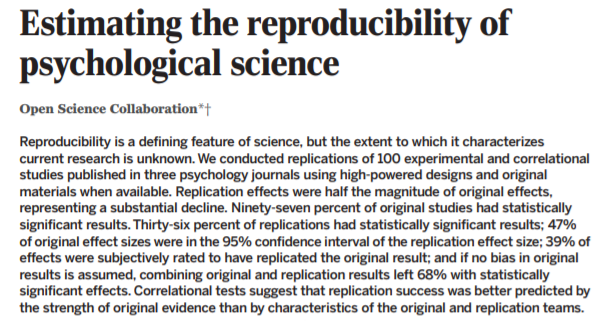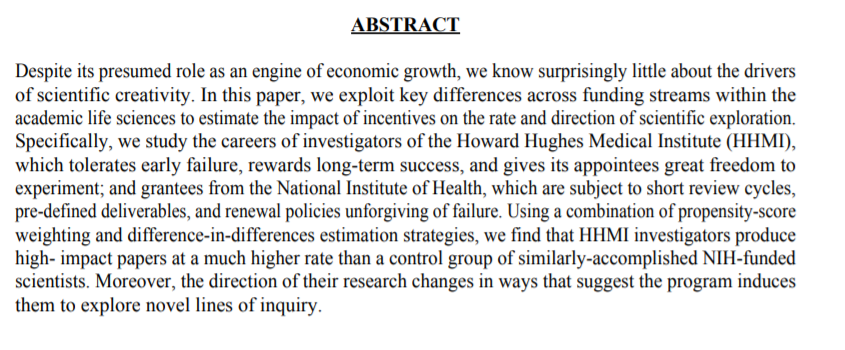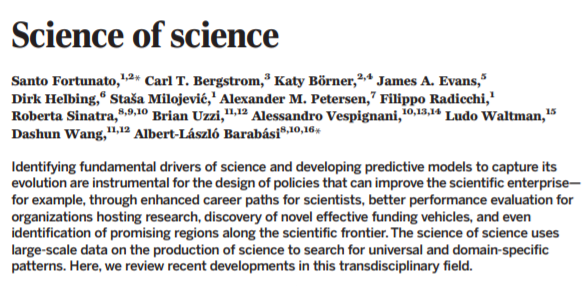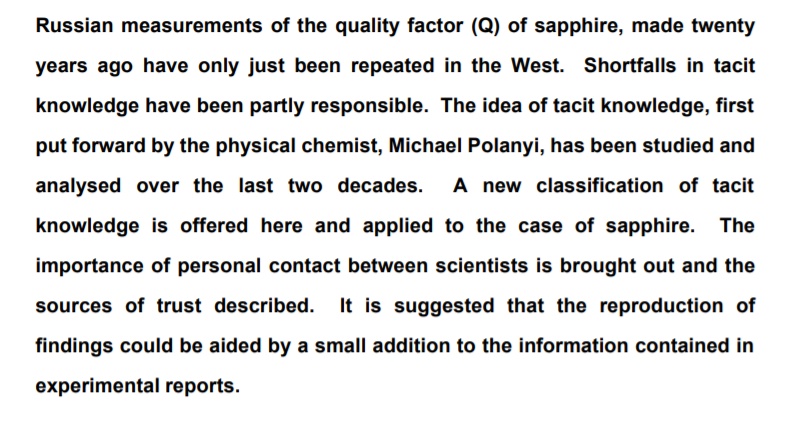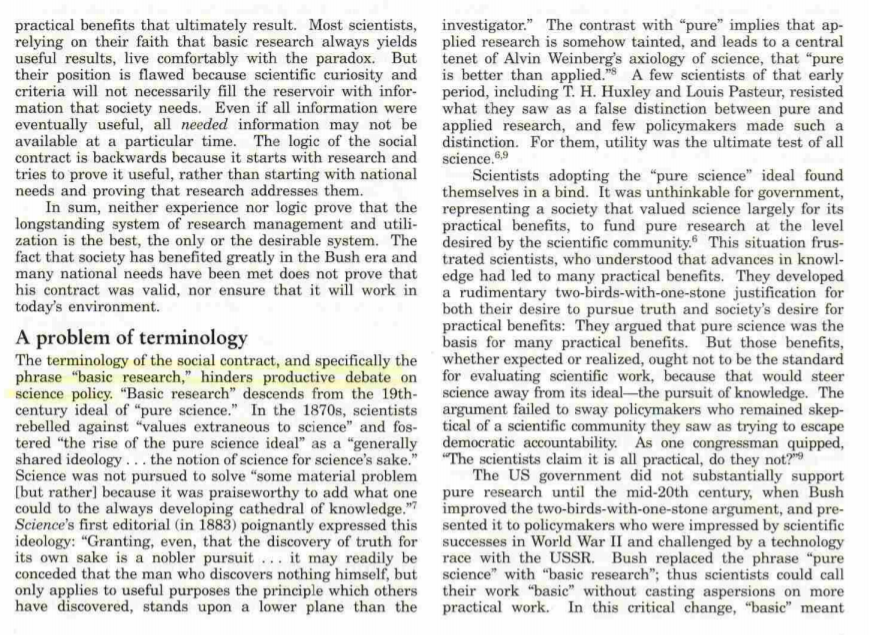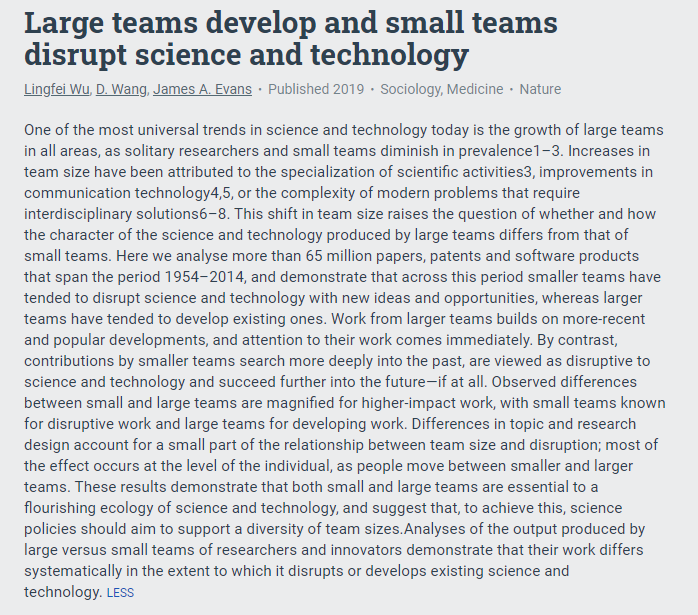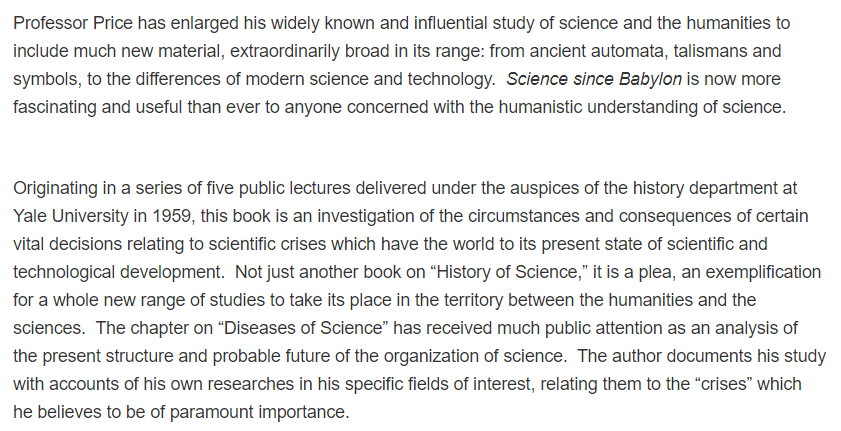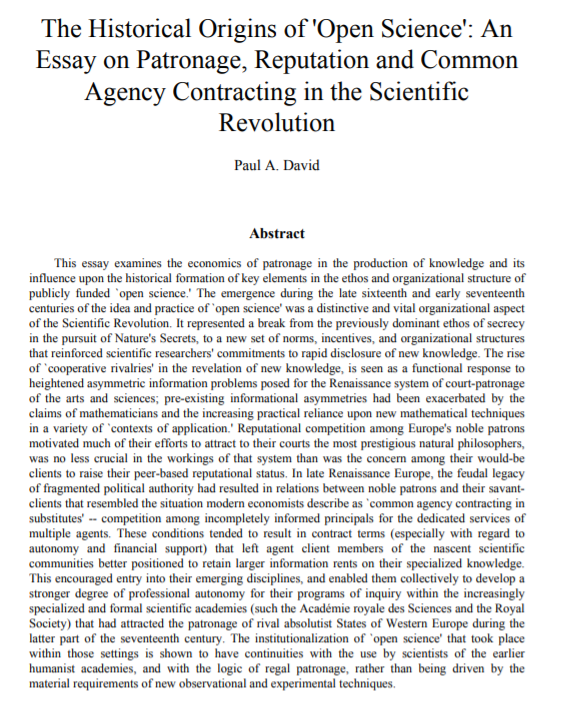What are the classics of the "Science of Science" or "Meta Science"? If you were teaching a class on the subject, what would go in the syllabus?
Here's a (very disorganized and incomplete) handful of suggestions, which I may add to. Suggestions welcome, especially if you've dug into relevant literatures.
1. The already classic "Estimating the reproducibility of
psychological science" from the Open Science Collaboration of @BrianNosek et al. https://ink.library.smu.edu.sg/cgi/viewcontent.cgi?article=6256&context=lkcsb_research
(Look at that abstract, wow!)
psychological science" from the Open Science Collaboration of @BrianNosek et al. https://ink.library.smu.edu.sg/cgi/viewcontent.cgi?article=6256&context=lkcsb_research
(Look at that abstract, wow!)
Many people had pointed out problems with standard statistical methods, going back decades (what are the best refs?). But this paper was a sledgehammer, making it impossible to ignore the question: what, if anything, were we actually learning from all those statistical studies?
2. Dean Keith Simonton's book "Creativity in Science: Chance, Logic, Genius, and Zeitgeist". If an essentially scientometric book could be described as a fun romp through science & creativity, this would be it https://www.amazon.com/Creativity-Science-Chance-Genius-Zeitgeist-ebook/dp/B01MTGC5B3/ref=sr_1_4?dchild=1&keywords=dean+keith+simonton&qid=1610639773&sr=8-4
3. From the philosophy of science literature, I especially like Lakatos's "Proofs and Refutations", Feyerabend's "Against Method", and Kuhn's "The Structure of Scientific Revolutions". I should probably dig deeper into other schools (recs?) (Yes, I've read Popper's main works.)
4. Speaking of Feyerabend, Steve Weinberg had some surprisingly sympathetic & characteristically insightful comments on Feyerabend, which I expect would bear re-reading. I've lost the reference.
5. Switching genre, there's the work of @pierre_azoulay and collaborators, studying the HHMI versus NIH approaches to discovery in the life sciences: https://www.nber.org/system/files/working_papers/w15466/w15466.pdf
6. From 2018, a nice review paper on "The Science of Science", coming from a network science / scientometrics point of view. There are tonnes of interesting observations in the paper, many of which I bundled up in this thread: https://twitter.com/michael_nielsen/status/971949129751396352
https://barabasi.com/f/939.pdf
https://barabasi.com/f/939.pdf
7. One of our best long-term observers of science and science policy was Daniel Greenberg (who passed away last year). Many possibilities to choose from, but here's one I got a lot out of: "Science, Money, and Politics": https://www.amazon.com/Science-Money-Politics-Political-Triumph/dp/0226306356/ref=sr_1_5?dchild=1&keywords=daniel+greenberg&qid=1610640551&sr=8-5
8. Harry Collins has done some wonderful work on the central role of tacit knowledge in science. Here's one of his classics, on the role of tacit knowledge in figuring out how good sapphire is as a lasing material: http://orca.cf.ac.uk/71069/1/wrkgpaper1.pdf
That sounds very specialized. It's not. It goes to questions at the very heart of science, both institutionally and methodologically. Rather, Collins' paper is a beautiful detailed study of tacit knowledge.
(Tangentially: one way my thinking has changed is in gradually understand how tied together our institutions and our methodologies are. There's a kind of Conway's Law in action: our institutions tend to mirror our methodology, and vice versa.)
9. The institutions around us are, of course, all made up, out of ideas - things like universities, PhDs, journals, etc, even the notion of "Science", are first and foremost conceptual innovations. I'd love to understand the history of those ideas better.
One striking text in this vein is Francis Bacon's 1627 "The New Atlantis", which introduces "Salamon's House", which strongly influenced the design of the Royal Society (1660), and modern universities. https://www.gutenberg.org/files/2434/2434-h/2434-h.htm
10. Another good one in this vein is Vannevar Bush's "Science: the Endless Frontier", which helped establish the concepts underpinning the modern basic research ecosystem https://www.nsf.gov/od/lpa/nsf50/vbush1945.htm
11. Indeed, I've heard it argued that Bush is the person most responsible for developing the concept of "basic research", and this was done in part as a way of winning a political fight to motivate funding for pure research. The argument is made here: https://cspo.org/legacy/library/090721F8CB_lib_PielkeBeyondBasi.pdf
12. David Lang suggests Paula Stephan's book here: https://twitter.com/davidtlang/status/1349755095869661184
The book has been in my queue for some time, and is almost certainly a good overview of a huge chunk of economic thinking about science.
The book has been in my queue for some time, and is almost certainly a good overview of a huge chunk of economic thinking about science.
Interlude: thanks for the many wonderful replies!!
Twitter threading makes it a little hard to skim the thread. Expandable tree version here, thanks to @paulgb's great treeverse Chrome extension: https://treeverse.app/view/oZ3DdaJq
Twitter threading makes it a little hard to skim the thread. Expandable tree version here, thanks to @paulgb's great treeverse Chrome extension: https://treeverse.app/view/oZ3DdaJq
I'll indulge myself a bit, and ask @dabacon, @AndrewDohertyQu, @quantum_aram, @uncatherio, @albrgr, @DGoroff, @BrianNosek, @juliagalef, @juanbenet, @AdamMarblestone, @patrickc, @pierre_azoulay if you have any particular favorite additions for the list?
13. More: Herb Simon on "The Sciences of the Artificial", https://www.amazon.com/Sciences-Artificial-reissue-third-introduction-ebook/dp/B08MQ2PJNT/ref=sr_1_3?dchild=1&keywords=herbert+simon&qid=1610679475&sr=8-3, and @DavidDeutschOxf's "Beginning of Infinity", both of which consider the ultimate scope of human understanding and creativity: https://www.amazon.com/Beginning-Infinity-Explanations-Transform-World/dp/0143121359/ref=tmm_pap_swatch_0?_encoding=UTF8&qid=1610679518&sr=8-1
14. A fun recent paper by @dashunwang, @profjamesevans and co about the relationship between team size and the nature of research conducted: https://www.zoology.ubc.ca/bdg/pdfs_bdg/2019spring/Wu_etal_2019.pdf
15. Derek de Solla Price is often recognized (along with Eugene Garfield) as cofounder of scientometrics. He wrote many thoughtful pieces ( https://scholar.google.com/citations?hl=en&user=Ev26B2YAAAAJ ), including "Science Since Babylon": https://www.amazon.com/Science-Since-Babylon-Derek-deSolla/dp/0300017987/ref=sr_1_1?dchild=1&keywords=science+since+babylon&qid=1610680129&sr=8-1
Let me do another round with treeverse, since there are now many more replies. Here's the entire discussion to date: https://treeverse.app/view/hXhcfQJA
You can simply mouseover different parts of the tree to see suggestions quickly and easily.
Thanks to everyone who has contributed!
You can simply mouseover different parts of the tree to see suggestions quickly and easily.
Thanks to everyone who has contributed!
16. On the political economy of science, let me mention again Paula Stephan's entire body of work ( https://scholar.google.com/citations?user=xWvCOh4AAAAJ&hl=en&oi=ao ), and Paul David's lovely paper on how science came to embrace openness as much as it has: http://citeseerx.ist.psu.edu/viewdoc/download?doi=10.1.1.463.7499&rep=rep1&type=pdf
I discussed David's paper here: https://twitter.com/michael_nielsen/status/1197254585339002881
It's not strictly about science, but I must also point to Elinor Ostrom's work, especially her wonderful "Governing the Commons" ( https://www.amazon.com/Governing-Commons-Evolution-Institutions-Collective/dp/1107569788/ref=sr_1_2?dchild=1&keywords=elinor+ostrom&qid=1610694051&sr=8-2). It's not quite about managing a knowledge commons, like science, but is deep & wise & sufficiently close to be worth reading

 Read on Twitter
Read on Twitter